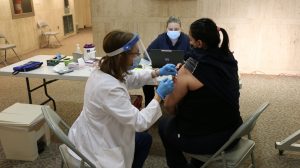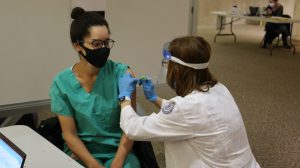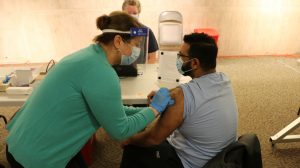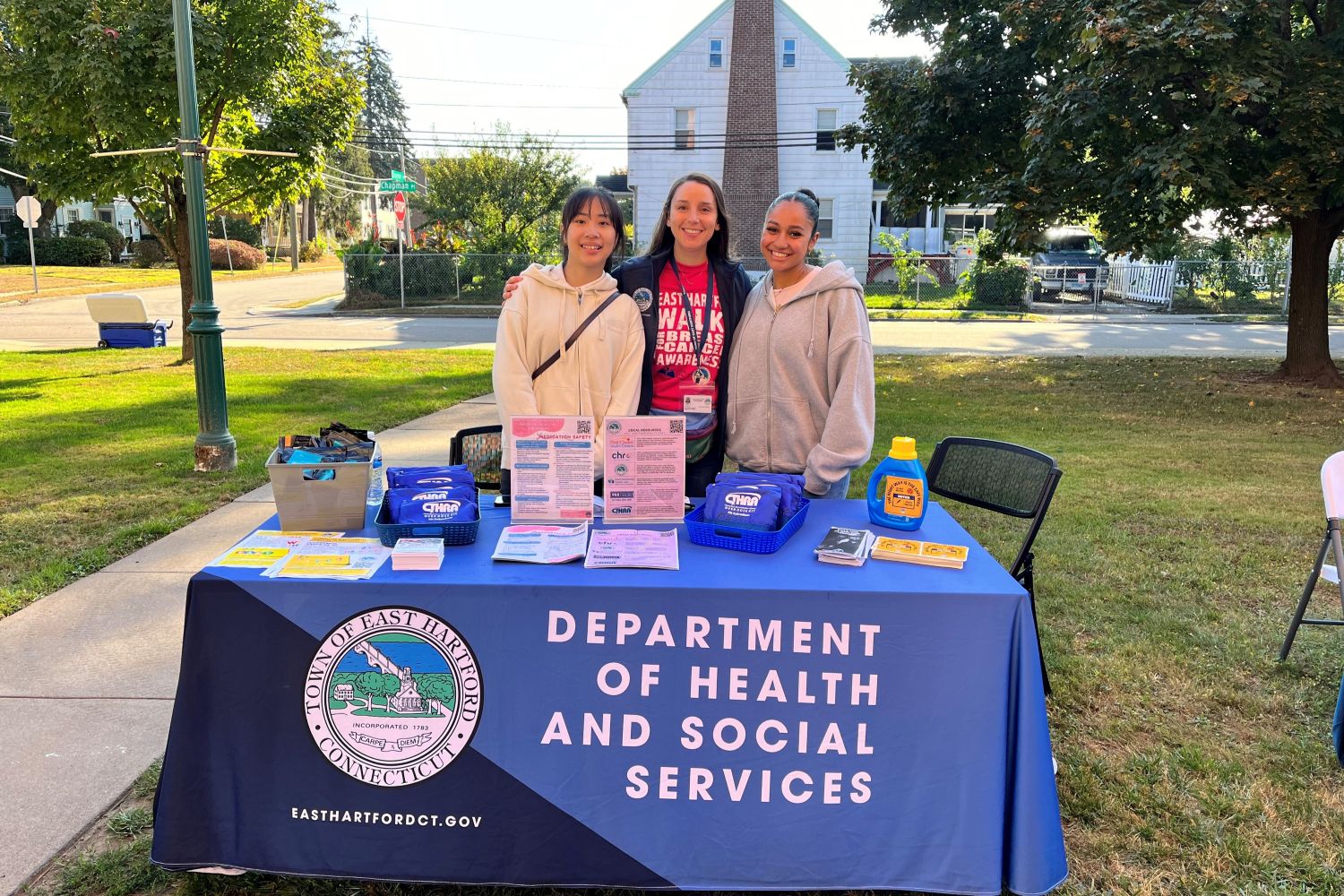UConn Today sat down with Dr. Jeff Aeschlimann, Infectious Diseases Pharmacist Specialist at UConn Health, to learn more about the second COVID-19 vaccine to be authorized for emergency use by the FDA and its maker Moderna. Find out just how this vaccine works, and how it stacks up to the first vaccine authorized for emergency use made by Pfizer. Learn more from Aeschlimann who also serves as an associate professor in the UConn School of Pharmacy and adjunct associate professor at UConn School of Medicine.

Q: Can you tell us more about the young company Moderna?
A: Moderna is located in Cambridge, MA, and has been the world leader in mRNA vaccines and therapeutic development which is important. They were founded in 2010 and have been doing this research as a pharmaceutical/biotechnology company for over 10 years. Their vaccine processes and technology were already very far along in development when COVID-19 appeared which is why they were able to rapidly move into clinical trials.
Q: How does the Moderna vaccine work?
A: The COVID vaccines developed by both Moderna and Pfizer/BioNTech contain messenger RNA (mRNA) coated in a layer of lipids (fat). The mRNA gives instructions for our cells to make a harmless piece of the “spike protein” which is found on the surface of the SARS-CoV-2 virus that causes COVID-19. After the protein is made, the mRNA is destroyed. Then, our bodies’ immune system recognizes that the protein should not be there and produces antibodies, as well as T-cells and B-cells that will remember how to fight the virus if we are exposed to it in the future. This will give you protection from infection by the SARS-CoV-2 virus.

Q: How safe and effective is the Moderna COVID-19 vaccine?
A: So far, the data from the clinical trials and from the experience during the first weeks of vaccine administration through the Emergency Use Authorization indicate that it is very safe and very effective. In the clinical trial, the vaccine was 95% effective at preventing COVID-19 infection, and it also appeared to prevent severe COVID-19 infections, too. The most common side effects associated with the vaccine have been local injection site pain, redness, or swelling. Some patients also may experience general side effects such as fatigue, muscle and/or joint aches, headache, chills, nausea and/or fever. They were more common to happen with the 2nd dose of the vaccine. These side effects are very similar to those seen with just about all commonly-used vaccines.
Q: How does the Moderna vaccine compare to the Pfizer vaccine?
A: Both the Moderna and the Pfizer/BioNTech vaccines use mRNA as the way of helping your body to develop immunity to the SARS-CoV-2 virus. Both have about 95% effectiveness. The safety and side effect profiles are also very similar. The only practical differences between the two are that the Pfizer/BioNTech vaccine must be stored at much colder freezer temperatures, and that the 2nd dose of the Moderna vaccine is given 28 days after the 1st dose (versus 21 days for the Pfizer/BioNTech vaccine).

Q: How extraordinary is it that such a young company such as Moderna has successfully created such an effective vaccine?
A: It’s definitely a testament to modern science to have a highly-effective vaccine available for administration to people approximately 1 year from the early stages of a global pandemic. Moderna has been doing extensive high-quality research with the mRNA vaccines and therapeutics for quite a few years, so they definitely were in a great position to achieve success. As they are a relatively small company, they partnered with the Federal Government (through “Operation Warp Speed”) to help set up the research infrastructure to successfully perform a large clinical research study.
It’s also worth noting that although it commonly gets referred to as the “Pfizer vaccine”, the Pfizer vaccine was actually first developed by a pharmaceutical company called BioNTech. This company is very similar to Moderna—a smaller biotechnology company in existence for about a decade. Pfizer developed a business partnership with BioNTech to help them speed up the research and development of the COVID vaccine—similar to what Moderna did with Operation Warp Speed.
Q: What’s your message to people who may not be as familiar or trusting of the vaccine baring the Moderna brand name compared to the more well-known brand name of Pfizer?
A: Moderna has been a world leader in mRNA vaccines and therapeutic development for quite some time. Many well-established pharmaceutical companies (examples: Merck, Astra-Zeneca) have already developed partnerships with Moderna for the research and development of a variety of new vaccines, anti-cancer treatments, and other new treatments/preventative therapies for infectious diseases. These companies would not have partnered with and invested significant resources in Moderna if they did not believe the company operated at the highest-expected standards for research and new treatment development. Finally, I’ll note that both the Moderna and Pfizer/BioNTech vaccines underwent nearly identical phase 3 clinical trials and the same FDA/CDC review and authorization. So, they have both been scrutinized to the same extent. I’m confident with the very high safety and effectiveness of both of these companies’ vaccines and would be comfortable getting either one.
Learn more about UConn Health’s COVID-19 Vaccine Program.



